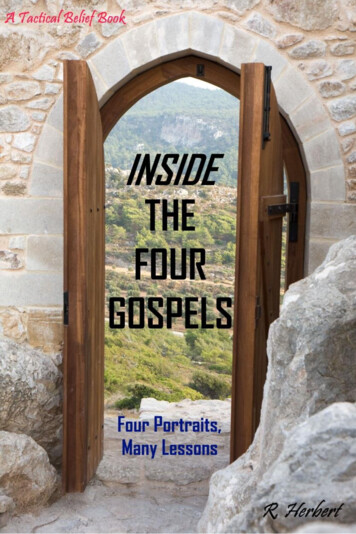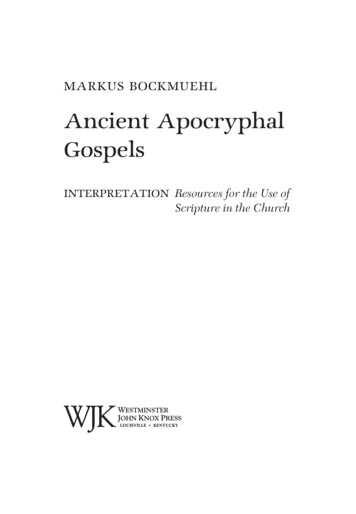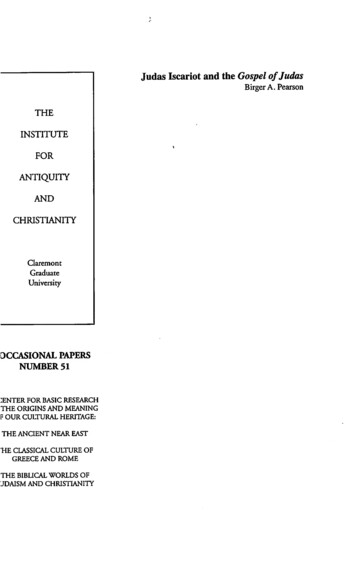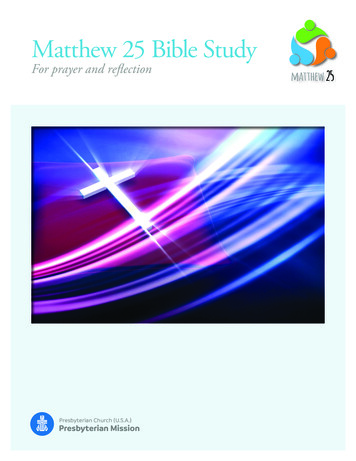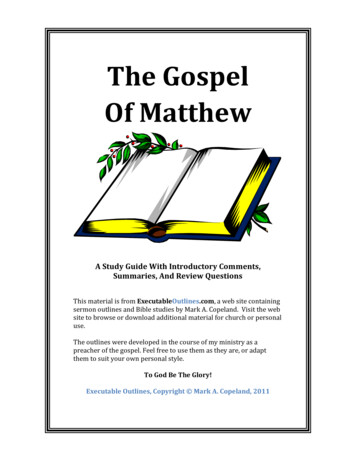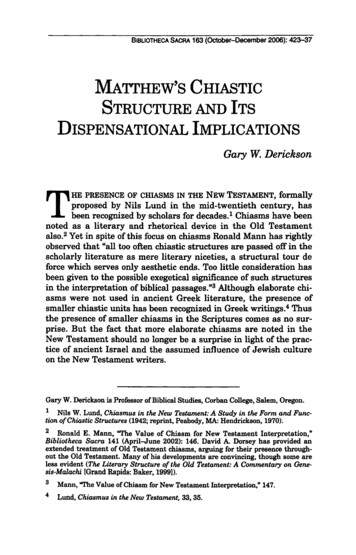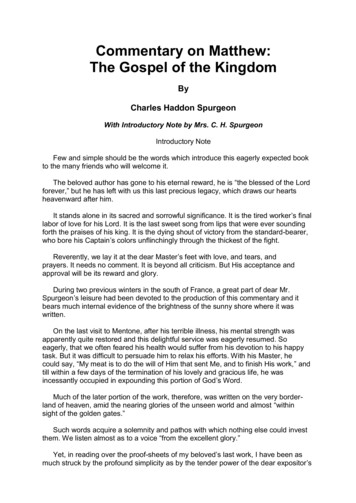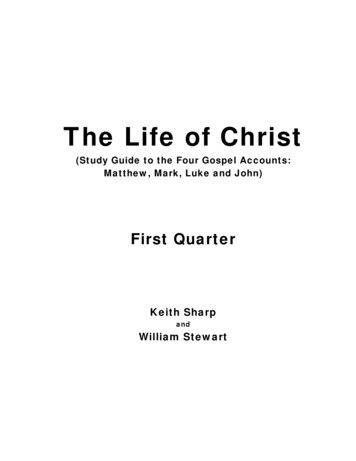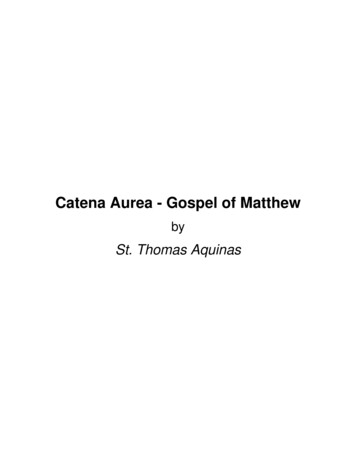
Transcription
Catena Aurea - Gospel of MatthewbySt. Thomas Aquinas
About Catena Aurea - Gospel of MatthewTitle:URL:Author(s):Publisher:Print Basis:Date Created:General Comments:CCEL Subjects:LC Call no:LC Subjects:Catena Aurea - Gospel of mlAquinas, Thomas, Saint (1225?-1274)Whiston, William (Translator)Grand Rapids, MI: Christian Classics Ethereal LibraryLondon: J.G.F. and J. Rivington, 18422000-07-09(tr. William Whiston)All; Classic; Bibles;BS2555The BibleNew TestamentSpecial parts of the New Testament
Catena Aurea - Gospel of MatthewSt. Thomas AquinasTable of ContentsAbout This Book. . . . . . . . . . . .Title Page. . . . . . . . . . . . . . . .Gospel of Matthew. . . . . . . . . .Chapter 1. . . . . . . . . . . . . . .Chapter 2. . . . . . . . . . . . . . .Chapter 3. . . . . . . . . . . . . . .Chapter 4. . . . . . . . . . . . . . .Chapter 5. . . . . . . . . . . . . . .Chapter 6. . . . . . . . . . . . . . .Chapter 7. . . . . . . . . . . . . . .Chapter 8. . . . . . . . . . . . . . .Chapter 9. . . . . . . . . . . . . . .Chapter 10. . . . . . . . . . . . . . .Chapter 11. . . . . . . . . . . . . . .Chapter 12. . . . . . . . . . . . . . .Chapter 13. . . . . . . . . . . . . . .Chapter 14. . . . . . . . . . . . . . .Chapter 15. . . . . . . . . . . . . . .Chapter 16. . . . . . . . . . . . . . .Chapter 17. . . . . . . . . . . . . . .Chapter 18. . . . . . . . . . . . . . .Chapter 19. . . . . . . . . . . . . . .Chapter 20. . . . . . . . . . . . . . .Chapter 21. . . . . . . . . . . . . . .Chapter 22. . . . . . . . . . . . . . .Chapter 23. . . . . . . . . . . . . . .Chapter 24. . . . . . . . . . . . . . .Chapter 25. . . . . . . . . . . . . . .Chapter 26. . . . . . . . . . . . . . .Chapter 27. . . . . . . . . . . . . . .Chapter 28. . . . . . . . . . . . . . .Indexes. . . . . . . . . . . . . . . . . .Index of Scripture References. .Index of Scripture Commentary.Greek Words and Phrases. . . .iii.p. iip. 1p. 2p. 2p. 41p. 63p. 83p. 104p. 152p. 192p. 215p. 240p. 262p. 292p. 312p. 346p. 377p. 397p. 415p. 434p. 450p. 470p. 490p. 508p. 534p. 555p. 578p. 610p. 632p. 676p. 706p. 721p. 721p. 724p. 724
Catena Aurea - Gospel of MatthewSt. Thomas AquinasHebrew Words and Phrases. . . . . . . . . . . . . . . . . . . . . . . . . . . . . p. 725Index of Pages of the Print Edition. . . . . . . . . . . . . . . . . . . . . . . . . p. 727iv
Catena Aurea - Gospel of MatthewSt. Thomas AquinasSt. Thomas AquinasCatena Aurea (Golden Chain)Volume I.J.G.F. and J. RivingtonLondon, 1842
Catena Aurea - Gospel of MatthewSt. Thomas AquinasVer. 1. The book of the generation of Jesus Christ, the Son of David, the Son of Abraham.9Jerome, Ez, i. 5. Hier. Prolog. in Com. in Matt.: ‘The face of a man’ (in Ezekiel’s vision) signifiesMatthew, who accordingly opens his Gospel with the human genealogy of Christ.Rabanus: By this exordium he shews that it is the birth of Christ according to the flesh that he hasundertaken to narrate.Pseudo-Chrys., Hom. in Matt., Hom. i: Matthew wrote for the Jews, and in Hebrew [ed. note: Itseems to be the general witness of antiquity that there was a Hebrew copy of St. Matthew’s Gospel,whether written before or after the Greek. This Hebrew copy was interpolated by the Ebionites.];to them it was unnecessary to explain the divinity which they recognized; but necessary to unfoldthe mystery of the Incarnation. John wrote in Greek for the Gentiles who knew nothing of a Sonof God. They required therefore to be told first, that the Son of God was God, then that this Deitywas incarnate.Rabanus: Though the genealogy occupies only a small part of the volume, he yet begins thus, “Thebook of the generation.” For it is the manner of the Hebrews to name their books from that withwhich they open; as Genesis.Gloss. Ordinaria: The full expression would be “This is the book of the generation;” but this is ausual ellipse; e.g. “The vision of Isaiah,” for, ‘This is the vision.’“Generation,” he says in the singular number, though there be many here given in succession, asit is for the sake of the one generation of Christ that the rest are here introduced.Chrys., Hom. in Matt., Hom. ii: Or he therefore entitles it, “The book of the generation,” becausethis is the sum of the whole dispensation, the root of all its blessings; viz. that God become man;for this once effected, all other things followed of course.10Rabanus: He says, “The book of the generation of Jesus Christ,” because he knew it was written,‘The book of the generation of Adam.’ He begins thus then, that he may oppose book to book, thenew Adam to the old Adam, for by the one were all things restored which had been corrupted bythe other.Jerome, Hier. Comm. in Matt., ch. 1: We read in Isaiah, “Who shall declare His generation?” [Isa53:8] But it does not follow that the Evangelist contradicts the Prophet, or undertakes what hedeclares impossible; for Isaiah is speaking of the generation of the Divine nature; St. Matthew ofthe incarnation of the human.Chrys.: And do not consider this genealogy a small thing to hear: for truly it is a marvellous thingthat God should descend to be born of a woman, and to have as His ancestors David and Abraham.Remigius: Though any affirm that the prophet (Isaiah) does speak of His human generation, weneed not answer to his enquiry, “Who shall declare it?” - “No man;” but, “Very few;” becauseMatthew and Luke have.2
Catena Aurea - Gospel of MatthewSt. Thomas AquinasRabanus: By saying, “of Jesus Christ,” he expresses both the kingly and priestly office to be inHim, for Jesus, who first bore this name, was after Moses, the first who was leader of the childrenof Israel; and Aaron, anointed by the mystical ointment, was the first priest under the Law.Hilary, Quaest. Nov. et Vet. Test. q. 40: What God conferred on those, who, by the anointing ofoil were consecrated as kings or priests, this the Holy Spirit conferred on the Man Christ; addingmoreover a purification. The Holy Spirit cleansed that which taken of the Virgin Mary was exaltedinto the Body of the Saviour, and this is that anointing of the Body of the Saviour’s flesh whenceHe was called Christ.[ed. note: This passage is from a work commonly ascribed to Hilary the Deacon. The Fathers bearout its doctrine; e.g. “Since the flesh is not holy in itself, therefore it was sanctified even in Christ,the Word which dwelt in it, through the Holy Ghost, sanctifying His own Temple, and changing itinto the energy of His own Nature. For therefore is Christ’s Body understood to be both holy andhallowing, as being made a Temple of the Word united to it bodily, as Paul says.” Cyril Alex. lib.v. in Joann. p. 992.In like manner, Gregory of Nazianzus speaks of “The Father of the True and really Anointed(Christ), whom He has anointed with the oil of gladness above His fellows, anointing the manhoodwith the Godhead, so as to make both one.” Orat. 5. fin]Because the impious craft of the Jews denied that Jesus was born of the seed of David, he adds,“The son of David, the son of Abraham.”11Chrys.: But why would it not have been enough to name one of them, David alone, or Abrahamalone? Because the promise had been made to both of Christ to be born of their seed. To Abraham,“And in thy seed shall all the nations of the earth be blessed.” [Gen 22:18] To David, “Of the fruitof thy body will I set upon thy seat.” [Ps 137:11]He therefore calls Christ the Son of both, to shew that in Him was fulfilled the promise to both.Also because Christ was to have three dignities; King, Prophet, Priest; but Abraham was prophetand priest; priest, as God says to him in Genesis, “Take an heifer;” [Gen 15:9] Prophet, as the Lordsaid to Abimelech concerning him, “He is a prophet, and shall pray for thee.” [Gen 20:7] Davidwas king and prophet, but not priest.Thus He is expressly called the son of both, that the threefold dignity of His forefathers might berecognized by hereditary right in Christ.Ambrose, in Luc. iii: He therefore names specially two authors of His birth - one who received thepromise concerning the kindreds of the people, the other who obtained the oracle concerning thegeneration of Christ; and though he is later in order of succession is yet first named, inasmuch asit is greater to have received the promise concerning Christ than concerning the Church, which isthrough Christ; for greater is He who saves than that which is saved.Jerome: The order of the names is inverted, but of necessity; for had he written Abraham first, andDavid afterwards, he would have to repeat Abraham again to preserve the series of the genealogy.3
Catena Aurea - Gospel of MatthewSt. Thomas AquinasPseudo-Chrys.: Another reason is that royal dignity is above natural, though Abraham was first intime, yet David is honour.Gloss.: But since from this title it appears that the whole book is concerning Jesus Christ, it isnecessary first to know what we must think concerning Him; for so shall be better explained whatthis book relates of Him.Aug., de Haer, et 10: Cerinthus then and Ebion made Jesus Christ only man; Paul of Samosata,following them, asserted Christ not to have had an existence from eternity, but to have begun to befrom His birth of the Virgin Mary; he also thought Him nothing more than man. This heresy wasafterwards confirmed by Photinus.Pseudo-Athan., Vigil. Tapsens. (Athan. Ed. Ben., vol ii, p. 646): The Apostle John, seeing longbefore by the Holy Spirit this man’s madness, rouses him from his deep sleep of error by thepreaching of his voice, saying, “In the beginning was the Word.” [John 1:1]12He therefore, who in the beginning was with God, could not in this last time take the beginning ofHis being from man. He says further, (let Photinus hear his words,) “Father, glorify Me with thatglory which I had with Thee before the world was.” [John 17:5]Aug., de Haeres. 19: The error of Nestorius was, that he taught that a man only was born of theBlessed Virgin Mary, whom the Word of God received not into Unity of person and inseparablefellowship; a doctrine which Catholic ears could not endure.Cyril of Alexandria, Ep. i. ad Monachos Egypti.: Saith the Apostle of the Only-begotten, “Whobeing in the form of God, thought it no robbery to be equal with God.” [Phil 2:6]Who then is this who is in the form of God? or how emptied He Himself, and humbled Himself tothe likeness of man? If the abovementioned heretics dividing Christ into two parts, i.e. the Manand the Word, affirm that it was the Man that was emptied of glory, they must first shew what formand equality with the Father are understood to be, and did exist, which might suffer any manner ofemptying.But there is no creature, in its own proper nature, equal with the Father; how then can any creaturebe said to be emptied? or from what eminence to descend to become man? Or how can he beunderstood to have taken upon Him, as though He had not at first, the form of a servant?But, they say, the Word being equal with the Father dwelt in Man born of a woman, and this is theemptying. I hear the Son truly saying to the Holy Apostles, “If any man love Me, he will keep Mysaying, and My Father will love him, and We will come unto him, and make Our abode with him.”[John 14:23]Hear how He saith that He and the Father will dwell in them that love Him. Do you then supposethat we shall grant that He is there emptied of His glory, and has taken upon Him the form of aservant, when He makes His abode in the hearts of them that love Him? Or the Holy Spirit, doesHe fulfil an assumption of human flesh when He dwells in our hearts?4
Catena Aurea - Gospel of MatthewSt. Thomas AquinasIsidore, Epist. lib. iv. 166: But not to mention all arguments, let us bring forward that one to whichall arguments point, that, for one who was God to assume a lowly guise both has an obvious use,and is an adaptation and in nothing contradicts the course of nature. But for one who is man tospeak things divine and supernatural is the highest presumption; for though a king may humblehimself a common soldier may not take on him the state of an emperor. So, if He were God mademan, all lowly things have place; but if mere man, high things have none.13Aug., de Haeres. 41: Sabellius they say was a disciple of Noctus, who taught that the same Christwas one and the same Father and Holy Spirit.Pseudo-Athan., Vigil. Tapsens. (ibid. p. 644): The audaciousness of this most insane error I willcurb by the authority of the heavenly testimonies, and demonstrate the distinct personality of theproper substance of the Son. I shall not produce things which are liable to be explained away asagreeable to the assumption of human nature; but shall offer such passages as all will allow to bedecisive in proof of His divine nature.In Genesis we find God saying, “Let Us make man in Our own Image.” By this plural numbershewing, that there was some other person to whom He spoke. Had He been one, He would havebeen said to have made Him in His own Image, but there is another; and He is said to have mademan in the Image of that other.Gloss.: Other denied the reality of Christ’s human nature. Valentinus said that Christ sent from theFather, carried about a spiritual or celestial body, and took nothing of the Virgin, but passed throughher as through a channel, taking nothing of her flesh. But we do not therefore believe Him to havebeen born of the Virgin, because by no other means He could have truly lived in the flesh, andappeared among men; but because it is so written in the Scripture, which if we believe not wecannot either be Christians, or be saved.But even a body taken of spiritual, or ethereal, or clayey substance, had He willed to change intothe true and very quality of human flesh, who will deny His power to do this? The Manichaeanssaid that the Lord Jesus Christ was a phantasm, and could not be born of the womb of a woman.But if the body of Christ was a phantasm, He was a deceiver, and if a deceiver, then He was notthe truth. But Christ is the Truth; therefore His Body was not a phantasm.Gloss.: And as the opening both of this Gospel, and of that according to Luke, manifestly provesChrist’s birth of a woman, and hence His real humanity, they reject the beginning of both theseGospels.14Aug., cont. Faust, ii, 1: Faustus affirms, that “the Gospel both begins, and begins to be so called,from the preaching of Christ, in which He no where affirms Himself to have been born of men.[ed. note: The Ebionites, as well as the Manichees, rejected the beginning of St. Matthew, vid.Epiphan. II arr. xxx. 23. And the Marcionites the beginning of St. Luke. Epiph. Haer. xlii, 11. Butwhat exact portion they rejected is doubtful.]Nay, so far is this genealogy from being part of the Gospel, that the writer does not venture so toentitle it; beginning, ‘The book of the generation,’ not ‘The book of the Gospel.’ Mark again, who5
Catena Aurea - Gospel of MatthewSt. Thomas Aquinascared not to write of the generation, but only of the preaching of the Son of God, which is properlyThe Gospel, begins thus accordingly, “The Gospel of Jesus Christ the Son of God.” Thus then, allthat we read in Matthew before the words, “Jesus began to preach the Gospel of the kingdom,”[Matt 4:!4] is a part of the genealogy, not of the Gospel. I therefore betook myself to Mark andJohn, with whose prefaces I had good reason to be satisfied, as they introduce neither David, norMary, nor Joseph.”To which Augustine replies, What will he say then to the Apostle’s words, “Remember theresurrection of Jesus Christ of the seed of David according to my Gospel.” [2 Tim 2:8] But theGospel of the Apostle Paul was likewise that of the other Apostles, and of all the faithful, as hesays, “Whether I, or they, thus have we preached the Gospel.”Aug., de Haer., 49: The Arians will not have the Father, Son, and Holy Spirit, to be of one and thesame substance, nature, and existence; but that the Son is a creature of the Father, and Holy Spirita creature of a creature, i.e. created by the Son; further, they think that Christ took the flesh withouta soul.But John declares the Son to be not only God, but even of the same substance as the Father; [marginnote: ref Id. de Trin. i. 6] for when he had said, “The Word was God,” he added, “all things weremade by Him;” whence it is clear that He was not made by Whom all things were made; and if notmade, then not created; and therefore of one substance with the Father, for all that is not of onesubstance with the Father is creature.I know not what benefit the person of the Mediator has conferred upon us, if He redeemed not ourbetter part, but took upon Him our flesh only, which without the soul cannot have consciousnessof the benefit. But if Christ came to save that which had perished, the whole man had perished, andtherefore needs a Saviour; Christ then in coming saves the whole man, taking on Him both souland body.15How too do they answer innumerable objections from the Gospel Scriptures, in which the Lordspeaks so many things manifestly contrary to them? as is that, “My soul is sorrowful even untodeath,” [Matt 26:38] and, “I have power to lay down My life;” [John 10:18] and many more thingsof the like kind.Should they say that He spoke thus in parables, we have at hand proofs from the Evangeliststhemselves, who in relating His actions, bear witness as to the reality of His body, so of His soul,by mention of passions which cannot be without a soul; as when they say, “Jesus wondered, wasangry,” and others of like kind.The Apollinarians also as the Arians affirmed that Christ had taken the human flesh without thesoul [margin note: Id. de Haeres. 55]. But overthrown on this point by the weight of Scripture proof,they then said that part which is the rational soul of man was wanting to the soul of Christ, and thatits place was filled by the Word itself.But if it be so, then we must believe that the Word of God took on Him the nature of some brutewith a human shape and appearance. But even concerning the nature of Christ’s body, there are6
Catena Aurea - Gospel of MatthewSt. Thomas Aquinassome who have so far swerved from the right faith, as to say, that the flesh and the Word were ofone and the same substance, most perversely insisting on that expression, The Word was madeflesh; which they interpret that some portion of the Word was changed into flesh, not that He tookto Him flesh of the flesh of the Virgin.[ed. note: Some of the Apollinarians thus hold. vid. Nyssen. vol. ii, p. 694. A.Theodor. Eranist. p.174. ed. Schulz. The same doctrine was afterwards ascribed to the Eutychians, vid. Vigil. Taps. inEutych. iv. Theod. Haer. iv. 13]Cyril, Ep. ad Joan. Antioch. tom. 6, Ep. 107: We account those persons mad who have suspectedthat so much as the shadow of change could take place in the nature of the Divine Word; it abideswhat it ever was, neither is nor can be changed.Leo, Epist. 59, ad Const.: We do not speak of Christ as man in such a sort as to allow that any thingwas wanting to Him, which it is certain pertains to human nature, whether soul, or rational mind,or flesh, and flesh such as was taken of the Woman, not gained by a change or conversion of theWord into flesh.16These three several errors, that thrice false heresy of the Apollinarists has brought forward. Eutychesalso chose out this third dogma of Apollinaris, which denying the verity of the human body andsoul, maintained that our Lord Jesus Christ was wholly and entirely of one nature, as though theDivine Word had changed itself into flesh and soul, and as though the conception, birth, growth,and such like, had been undergone by that Divine Essence, which was incapable of any such changeswith the very and true flesh; for such as is the nature of the Only-begotten, such is the nature of theFather, and such is the nature of the Holy Ghost, both impassible and eternal.But if to avoid being driven to the conclusion that the Godhead could feel suffering and death, hedeparts from the corruption of Apollinaris, and should still dare to affirm the nature of the incarnateWord, that is of the Word and the flesh, to be the same, he clearly falls into the insane notions ofManichaeus and Marcion, and believes that the Lord Jesus Christ did all His actions with a falseappearance, that His body was not a human body, but a phantasm, which imposed on the eyes ofthe beholders.But what Eutyches ventured [margin note: Id. Ep. 35 ad Julian] to pronounce as an episcopaldecision, that in Christ before His incarnation were two natures, but after His incarnation only one,it behoved that he should have been urgently pressed to give the reason of this his belief.I suppose that in using such language he supposed the soul which the Saviour took, to have had itsabode in heaven before it was born of the Virgin Mary [ed. note, e: This opinion, which involvesNestorianism, the opposite error to Eutychianism or Monophysitism, is imputed to Eutyches byFlavian, ap. Leon. Ep. xxii. 3. Ephraem, Antioch, ap Phot. p. 805. Leont. de Sectis 7 init].This Catholic hearts and ears endure not, for that the Lord when He came down from heaven shewednothing of the condition of human nature, nor did He take on Him any soul that had existed before,nor any flesh that was not taken of the flesh of His mother. Thus what was justly condemned inOrigen [ed. note, f: Vid. Origen in Joan. t. i. n. 37. t. xx. n. 17. Patriarch. ii. 6. n. 4. ix. Cels. i. 32,7
Catena Aurea - Gospel of MatthewSt. Thomas Aquinas33], must needs be rebuked in Eutyches, to wit, that our souls before they were placed in our bodieshad actions not only wonderful but various.Remig: These heresies therefore the Apostles overthrow in the opening of their Gospels, as Matthewin relating how He derived His descent from the kings of the Jews proves Him to have been trulyman and to have had true flesh.Likewise Luke, when he describes the priestly stock and person; Mark when he says, “The beginningof the Gospel of Jesus Christ the Son of God;” and John when he says, “In the beginning was theWord;” both shew Him to have been before all ages God, with God the Father.172. Abraham began Isaac; and Isaac begat Jacob; and Jacob begat Judas and his brethren.Aug., de Con. Evan., ii, 1: Matthew, by beginning with Christ’s genealogy, shews that he hasundertaken to relate Christ’s birth according to the flesh. But Luke, as rather describing Him as aPriest for the atonement of sin, gives Christ’s genealogy not in the beginning of his Gospel, but atHis baptism, when John bare that testimony, “Lo, He that taketh away the sins of the world.” [John1:29]In the genealogy of Matthew is figured to us the taking on Him of our sins by the Lord Christ: inthe genealogy of Luke, the taking away of our sins by the same; hence Matthew gives them in adescending, Luke in an ascending, series. But Matthew, describing Christ’s human generation indescending order, begins his enumeration with Abraham.Ambrose, in Luc. cap. 3. lib. iii. n. 7,8: For Abraham was the first who deserved the witness offaith; “He believed God, and it was accounted to him for righteousness.” It behoved therefore thathe should be set forth as the first in the line of descent, who was the first to deserve the promise ofthe restoration of the Church, “In thee shall all the nations of the earth be blessed.” And it is againbrought to a period in David, for that Jesus should be called his Son; hence to him is preserved theprivilege, that from him should come the beginning of the Lord’s genealogy.Chrys., Hom. iii, and Aug. City of God, 15, 15: Matthew then, desiring to preserve in memory thelineage of the Lord’s humanity through the succession of His parents, begins with Abraham, saying,“Abraham begat Isaac.” Why does he not mention Ismael, his first-born? And again, “Isaac beganJacob;” why does he not speak of Esau his first-born? Because through them he could not havecome down to David.Gloss.: Yet he names all the brethren of Judah with him in the lineage. Ismael and Esau had notremained in the worship of the true God; but the brethren of Judah were reckoned in God’s people.18Chrys., Hom. iii: Or, he names all the twelve Patriarchs that he may lower that pride which is drawnfrom a line of noble ancestry. For many of these were born of maidservants, and yet were Patriarchsand heads of tribes.8
Catena Aurea - Gospel of MatthewSt. Thomas AquinasGloss: But Judah is the only one mentioned by name, and that because the Lord was descendedfrom him only. But in each of the Patriarchs we must note not their history only, but the allegoricaland moral meaning to be drawn from them; allegory, in seeing whom each of the Fathers foreshewed;moral instruction in that through each one of the Fathers some virtue may be edified in us eitherthrough the signification of his name, or through his example.[ed. note: Origen considered that there were three senses of Scripture, the literal or historical, themoral, and the mystical or spiritual, corresponding to the three parts of man, body, and soul, andspirit. Hom. in Lev. ii, 5, de Princio iv, p. 168. By the moral sense is meant, as the name implies,a practical application of the text; by mystical one which interprets it of the invisible and the spiritualworld.]Abraham is in many respects a figure of Christ, and chiefly in his name, which is interpreted theFather of many nations, and Christ is Father of many believers. Abraham moreover went out fromhis own kindred, and abode in a strange land; in like manner Christ, leaving the Jewish nation, wentby His preachers throughout the Gentiles.Pseudo-Chyrs.: Isaac is interpreted, ‘laughter,’ but the laughter of the saints is not the foolishconvulsion of the lips, but the rational joy of the heart, which was the mystery of Christ. For as hewas granted to his parents in their extreme age to their great joy, that it might be known that hewas not the child of nature, but of grace, thus Christ also in this last time came of a Jewish motherto be the joy of the whole earth; the one of a virgin, the other of a woman past the age, both contraryto the expectation of nature.Remig.: Jacob is interpreted, ‘supplanter,’ and it is said of Christ, “Thou hast cast down beneathMe them that rose up against Me.” [Ps 18:43]Pseudo-Chrys.: Our Jacob in like manner begot the twelve Apostles in the Spirit, not in the flesh;in word, not in blood. Judah is interpreted, ‘confessor,’ for he was a type of Christ who was to bethe confessor of His Father, as He spake, “I confess to Thee, Father, Lord of heaven and earth.”19Gloss: Morally; Abraham signifies to us the virtue of faith in Christ, as an example himself, as itis said of him, “Abraham believed God, and it was accounted unto Him for righteousness.” Isaacmay represent hope; for Isaac is interpreted, ‘laughter,’ as he was the joy of his parents; and hopeis our joy, making us to hope for eternal blessings and to joy in them. “Abraham begat Isaac,” andfaith begets hope. Jacob signifies, ‘love,’ for love embraces two lives; active in the love of ourneighbour, contemplative in the love of God; the active is signified by Leah, the contemplative byRachel. For Leah is interpreted ‘labouring,’ [ed. note, h: Leah full of labour, Jerom. de nomin.Hebr. from לאה , to weary one’s self.] for she is active in labour; Rachel ‘having seen the beginning,’[ed. note, i: Rachel, in ewe, (as Gen. xxxi, 38, &c.) Jerom. ibid. who also gives the interpretationin the text, from ראה and חְחִלָּה( חלל beginning.] because by the contemplative, the beginning,that is God, is seen. Jacob is born of two parents, as love is born of faith and hope; for what webelieve, we both hope for and love.9
Catena Aurea - Gospel of MatthewSt. Thomas Aquinas3-6. And Judas begat Phares and Zara of Thamar; and Phares begat Esrom; and Esrom begat Aram;and Aram begat Aminadab; and Aminadab begat Naasson; and Naasson begat Salmon; and Salmonbegat Booz of Rachab; and Booz begat Obed of Ruth; and Obed begat Jesse; and Jesse begat Davidthe king.Gloss: Passing over the other sons of Jacob, the Evangelist follows the family of Judah, saying,“But Judah begat Phares and Zara of Thamar.”Augustine, City of God, 15, 15: Neither was Judah himself first-born, nor of these two sons waseither his first-born; he had already had three before them. So that he keeps in that line of descent,by which he shall arrive at David, and from him whither he purposed.Jerome: It should be noted, that none of the holy women are taken into the Saviour’s genealogy,but rather such as Scripture has condemned, that He who came for sinners being born of sinnersmight so put away the sins of all; thus Ruth the Moabitess follows among the rest.20Ambrose, in Luc. 3: But Luke has avoided the mention of these, that he might set forth the seriesof the priestly race immaculate. But the plan of St. Matthew did not exclude the righteousness ofnatural reason; for when he wrote in his Gospel, that He who should take on Him the sins of all,was born in the flesh, was subject to wrongs and pain, he did not think it any detraction from Hisholiness that
Pseudo-Chrys., Hom. in Matt., Hom. i: Matthew wrote for the Jews, and in Hebrew [ed. note: It seems to be the general witness of antiquity that there was a Hebrew copy of St. Matthew’s Gospel, whether written before o

